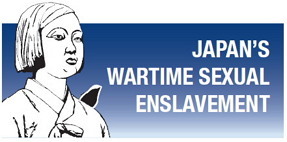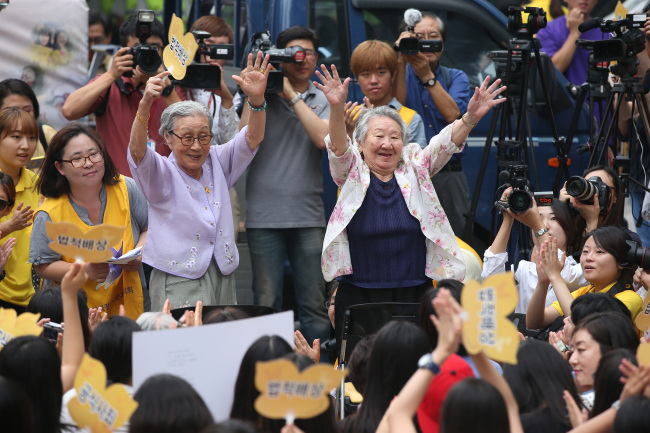In solidarity with wartime rape victims
Demanding Japan’s apology for wartime sexual enslavement upholds universal value of human rights, activists say
By Claire LeePublished : Aug. 24, 2014 - 20:33
The following is the third in a series of articles on Japan’s wartime sexual enslavement of Asian women on the occasion of the 61st anniversary of the foundation of The Korea Herald on Aug. 15. ― Ed.
For Kim Bok-dong and Gil Won-ok, two of some 50 surviving Korean victims of sexual slavery for soldiers during Japanese colonial rule, 2012 was a meaningful year.
The two, who had been demanding Japan’s apology and reparations for their forced wartime enslavement ― and still do ― established “The Butterfly Fund” in their efforts to help female victims of sexual violence in armed conflicts around the world.
 Kim, 89, and Gil, 86, also openly pledged in the same year to donate any funds they receive in legal compensation from the Japanese government, either posthumously or while they are still alive, to aid wartime rape victims worldwide.
Kim, 89, and Gil, 86, also openly pledged in the same year to donate any funds they receive in legal compensation from the Japanese government, either posthumously or while they are still alive, to aid wartime rape victims worldwide.
“(The establishment of the fund) was the moment when the victims turned themselves into activists,” said Kim Dong-hee, the Secretary-General of the Korean Council for the Women Drafted for Military Sexual Slavery by Japan. The NGO has been working with the victims for more than 23 years.
“One of the many concerns the two women had prior to the year 2012 was what would happen after they die. They wanted the ongoing activism to continue (even after their deaths), and wanted to make a difference in stopping violence against women during armed conflicts. They wanted to be in solidarity with others who are suffering.”
The victims’ sharing of their experience as Japan’s wartime sex slaves, as well as their activism for women’s human rights, has a significant value in raising awareness of sexual violence against women in conflicts, according to Seo Hyun-ju, a research fellow at Northeast Asian History Foundation.
For Kim Bok-dong and Gil Won-ok, two of some 50 surviving Korean victims of sexual slavery for soldiers during Japanese colonial rule, 2012 was a meaningful year.
The two, who had been demanding Japan’s apology and reparations for their forced wartime enslavement ― and still do ― established “The Butterfly Fund” in their efforts to help female victims of sexual violence in armed conflicts around the world.
 Kim, 89, and Gil, 86, also openly pledged in the same year to donate any funds they receive in legal compensation from the Japanese government, either posthumously or while they are still alive, to aid wartime rape victims worldwide.
Kim, 89, and Gil, 86, also openly pledged in the same year to donate any funds they receive in legal compensation from the Japanese government, either posthumously or while they are still alive, to aid wartime rape victims worldwide. “(The establishment of the fund) was the moment when the victims turned themselves into activists,” said Kim Dong-hee, the Secretary-General of the Korean Council for the Women Drafted for Military Sexual Slavery by Japan. The NGO has been working with the victims for more than 23 years.
“One of the many concerns the two women had prior to the year 2012 was what would happen after they die. They wanted the ongoing activism to continue (even after their deaths), and wanted to make a difference in stopping violence against women during armed conflicts. They wanted to be in solidarity with others who are suffering.”
The victims’ sharing of their experience as Japan’s wartime sex slaves, as well as their activism for women’s human rights, has a significant value in raising awareness of sexual violence against women in conflicts, according to Seo Hyun-ju, a research fellow at Northeast Asian History Foundation.

The issue should not be only discussed within the framework of Japan-Korea relations, but should be talked about in regards to the meaning of human dignity, she added.
“There have been many wartime crimes against women throughout history, but Japan’s sexual enslavement of women during World War II is different from many other (war time sexual violence) cases in the sense that it was committed by Japan as a state, (not as Japanese individuals,) and it was systemically planned and enforced against women,” said Seo.
“Japan’s acknowledgement and official apology would therefore mean a lot not only to the surviving victims but also (to the world.) It would be a very important step for the global community to understand that such a tragedy must not be repeated.”
Even after the end of World War II, wartime sexual violence against women has occurred frequently around the world.
The first woman who received help from the Butterfly Fund was Rebecca Masika Katsuva, a Congolese wartime rape victim who now runs a shelter for victims like herself. In 1998, during Congo’s long-running civil war, Katsuva and her daughters were gang raped, and her husband killed.
The Butterfly Fund is also used to aid Vietnamese women who were raped by Korean soldiers from 1964 to 1973 during the Vietnam War.
During the Bosnian War, it is believed that some 15,000 to 50,000 women, mostly Bosnian Muslims, were raped by Serbian soldiers as part a systematic ethnic cleansing program. Only about 40 rape cases have been prosecuted since the end of war in 1995.
Erin-Claire Barrow, who works at Women’s International League for Peace and Freedom in Australia, points out that increasing women’s participation in peacebuilding is crucial for changing attitudes on wartime sexual violence.
In post-conflict societies, the “likelihood that legislation against sexual violence will be enacted increases” when women are elected to government leadership roles, Barrow said in an international forum held recently in Seoul.
For example, the first legislation in Rwanda to combat sexual violence was introduced by the cross-party Forum of Women Parliamentarians following the country’s 1994 genocide, she explained.
“We need to look beyond the narrative of women as victims in conflict situations, and see women as active agents of change,” Barrow wrote in her presentation materials prepared for the forum.
Kim Bok-dong was only 14 when she was forcefully taken away by the Japanese in 1939. At the time, Kim was told she was going to be working at a military clothing factory.
She was forced onto a ship at a Busan port that took her to Taiwan, then to South Sea Islands and many other battlefields, where she was forced into prostitution. She returned to Korea in 1948, at age 22, and made a living by running a restaurant in Busan until she revealed that she was a victim of Japan’s wartime enslavement in 1992. She never married and has no children.
Kim is one of some 200,000 women, mostly from Korea and China, who were forced into sexual slavery by the Japanese. After the war ended, many of them were forced by Japanese soldiers to join them in mass suicides, while most of the survivors became infertile due to sexually transmitted diseases and severe trauma.
Many of the victims, euphemistically called “comfort women,” have already died from old age. There are only 54 survivors, including Kim, remaining in Korea.
“The name of the fund ― ‘The Butterfly Fund’ ― has a symbolic meaning,” Kim from the Korean Council for the Women Drafted for Military Sexual Slavery by Japan said.
“We activists would like the victims to be free from their hurtful past ― like a butterfly that has just come out of its cocoon.”
In its effort to bring more international attention to the issue, Korea’s Gender Ministry recently announced that it planned to apply for UNESCO designation for documents related to the Korean victims of Japan’s wartime slavery.
“I think it would be more meaningful if Korea does this project with other countries, as Japan forced women from other nations into sex slavery,” scholar Seo from Northeast Asian History Foundation said.
“It would be meaningful to collect the related documents in different countries and apply for UNESCO designation together, as this is a universal human rights issue.”
Korea should also make efforts to acknowledge war crimes committed by its own people, she said.
“We are asking the Japanese government for an apology,” she said. “And if there has been any government involvement in rape of Vietnamese women by Korean soldiers during the Vietnam War, then our government owes the Vietnamese victims an apology, too.”
By Claire Lee (dyc@heraldcorp.com)



![[Exclusive] Korean military set to ban iPhones over 'security' concerns](http://res.heraldm.com/phpwas/restmb_idxmake.php?idx=644&simg=/content/image/2024/04/23/20240423050599_0.jpg&u=20240423183955)

![[Graphic News] 77% of young Koreans still financially dependent](http://res.heraldm.com/phpwas/restmb_idxmake.php?idx=644&simg=/content/image/2024/04/22/20240422050762_0.gif&u=)



![[Pressure points] Leggings in public: Fashion statement or social faux pas?](http://res.heraldm.com/phpwas/restmb_idxmake.php?idx=644&simg=/content/image/2024/04/23/20240423050669_0.jpg&u=)









